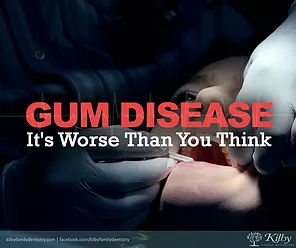Gum Disease: It’s Worse Than You Think
- Dr. Dustin Kilby, D.M.D. July 14, 2017

In recent years, dental research has gained incredible knowledge regarding periodontal (gum) disease and its relation to general health. Our body is a system in which a problem in one area will often affect other areas of the body. In the case of gum disease, the disease causing bacteria from your mouth can enter the bloodstream and circulate throughout your body. The bacteria in your body’s circulation can form sticky accumulations, called plaque, which adhere to arterial walls and release toxins. Once toxins are released, your body’s bacteria-fighting blood cells can trigger an autoimmune response, which can actually increase the build-up of plaque and cause more inflammation. In addition, the bacteria from your mouth can be transferred from one person to another through kissing, sharing toothbrushes, etc.
Heart disease, Alzheimer's, respiratory diseases, diabetes, arthritis, osteoporosis, and low birth-weight babies are just a few of the conditions that have shown a link to the bacteria associated with gum disease. Recently, researchers found that men with gum disease were 49% more likely to develop kidney cancer, 54% more likely to develop pancreatic cancer, and 30% more likely to develop blood cancers. Roughly 75% of American adults have some level of periodontal disease. Obviously, the first step in avoiding this condition is to brush and floss your teeth every single day. This reduces the likelihood of bacterial procreation in your mouth. Make sure that your partner is doing the same. Regular, professional cleaning in a dental office is also essential for the removal of tarter in hard to reach areas that you are missing by brushing and flossing alone. Also, your Dentist will be able to complete a thorough exam of your mouth, head and neck region, conduct oral cancer screening, answer any questions you may have about your health, and evaluate your oral homecare.
If you suffer from bleeding when you brush or floss, persistent bad breath, or red, swollen gums, you need to contact a Dentist who can help you overcome this problem. If you don’t have a Dental home, we would love to welcome you to join our family at Kilby Family Dentistry. Call Kilby Family Dentistry at (229) 247-0200 to schedule a free consultation.
